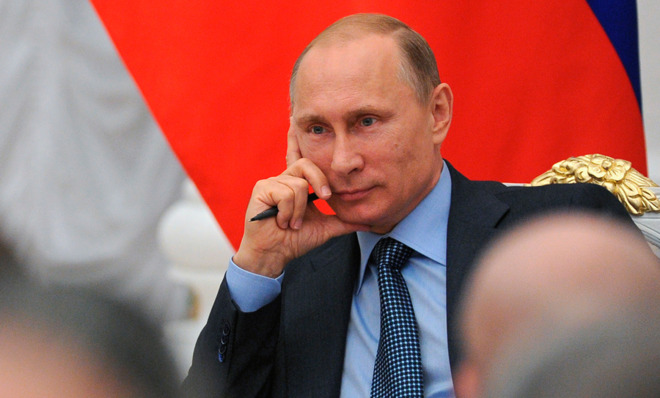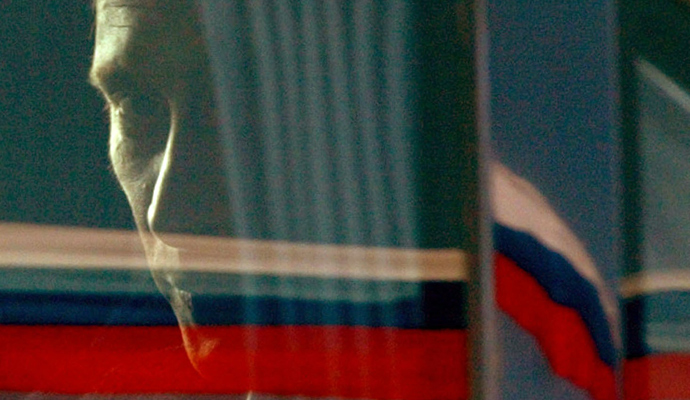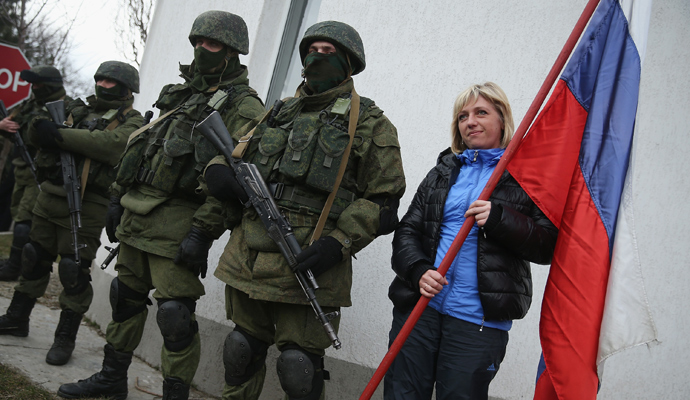Want to contain Vladimir Putin? Treat him like a Cold Warrior.
The roots of Putin's worldview go back to the fall of the Berlin Wall

A free daily email with the biggest news stories of the day – and the best features from TheWeek.com
You are now subscribed
Your newsletter sign-up was successful

Nov. 9, 1989, the Berlin Wall fell. "To fall" is an interesting choice of words. Although small portions of the wall literally came down, what really happened was that the German Democratic Republic — East Germany — suddenly lost the will to police what was officially called the "Anti-Fascist Protection Rampart." (Remember that monstrous lie the next time RT calls the Ukrainian government a bunch of Nazis.) Mikhail Gorbachev's Soviet Union stood by, doing nothing, while its client state collapsed in all but name.
The fall of the Berlin Wall sparked protests across East Germany. In many cities, jubilant East Germans ransacked offices belonging to the Stasi, the ubiquitous secret police. In Dresden on the evening of Nov. 9, a 39-year-old lieutenant colonel serving the Soviet Committee for State Security, the KGB, was not sure what to do. Vladimir Putin was trapped in an office surrounded by a crowd of East Germans who were about to force their way into the KGB residency and loot its files. (This story has gotten a bit better with each retelling, but still — nothing says FOIA like an angry mob.) Putin could not get through to Moscow. Eventually, he persuaded the mob to go home, either by persuading them he and his agents were simply Russian translators or by brandishing a pistol.
We mark the end of the Cold War with the fall of the Berlin Wall, not the collapse of the Soviet Union. The reason is simple: The Soviet Union had used force or the threat of force to maintain what was essentially an empire of puppet states, particularly in Hungary in 1956, Prague in 1968, and Poland in 1981. When Gorbachev did not use force to maintain his empire, there was little cause to quarrel with Moscow. A series of revolutions swept through Central and Eastern Europe, culminating in the dissolution of the Soviet Union itself after a failed coup against Gorbachev in 1991. The post-Cold War settlement was based fundamentally on Gorbachev's decision to forsake the use of force to maintain the subjugation of his neighbors.
The Week
Escape your echo chamber. Get the facts behind the news, plus analysis from multiple perspectives.

Sign up for The Week's Free Newsletters
From our morning news briefing to a weekly Good News Newsletter, get the best of The Week delivered directly to your inbox.
From our morning news briefing to a weekly Good News Newsletter, get the best of The Week delivered directly to your inbox.
Mr. Putin, sitting in Dresden 25 years ago, seems to have had a different view. (I half suspect that every time Putin hears Jesus Jones's single "Right Here, Right Now," he suddenly turns green and starts Hulksmashing everything in sight. Or maybe it's the whistle of the Scorpions that sets him off?)
Asked decades later whether Moscow had done everything it could to save East Germany — undoubtedly a reference to the use of force — Putin declined to answer. It should be pretty easy to say Moscow was right not to use force. But recent events in Georgia in 2008 and Ukraine over the past six months suggest why Putin demurred — it's not hard to imagine that he would have sent the Red Army to turn the raucous joy of Berlin in 1989 into a bloodbath like Budapest in 1956 or Prague in 1968.
This is also why Putin continues to assert that NATO threatens Moscow. Would NATO invade Russia, or use military force to support succession movements in Chechnya? What's so threatening about being surrounded by free, democratic neighbors anyway?
On the other hand, why are Russia's neighbors so eager to join NATO? The point of Moscow's barrage of propaganda accusing the Ukrainian government of being Nazis and fascists is to distract attention from the actual dispute: Moscow believes its security depends on the insecurity of its neighbors. When Putin described the collapse of the Soviet Union as a "major geopolitical disaster of the century," that is really what he meant. He can't feel safe unless Moscow controls a ring of puppet states around its borders. And if that means cracking heads, he's willing to do it.
A free daily email with the biggest news stories of the day – and the best features from TheWeek.com
(More from Foreign Policy: The slaughter of innocents)
This is a classically Soviet view, which isn't surprising. When the wall came down, Putin was a fully-grown adult. He continued serving in the KGB until the bitter end. (He resigned after the August 1991 coup.) Is it so surprising that Putin still thinks about the world in more or less the same terms he did when he was 40?
It's worth revisiting a classic for a peek into Putin's worldview. In the United States, the now-classic diagnosis of Soviet behavior was written in a lengthy diplomatic cable by George Kennan known as the long telegram, which Kennan later published as "Mr. X" in Foreign Affairs under the title "The Sources of Soviet Conduct."
"[T]he stress laid in Moscow on the menace confronting Soviet society from the world outside its borders," Kennan wrote, "is founded not in the realities of foreign antagonism but in the necessity of explaining away the maintenance of dictatorial authority at home." This is easy enough to understand today. Putin can hardly admit that the people of Ukraine simply grew tired of an authoritarian regime that was corrupt down to its gold toilet seats. Instead, he must imagine plots involving the CIA and fascists to discredit those who seek a democratic and accountable government. (Of course, Washington too often adds fuel to these conspiracies.) Putin claims that Color Revolutions and Pussy Riot concerts are CIA plots for the same reason East Germany had to pretend the wall across Berlin was designed to keep fascists out, rather than Germans in. Kennan's essay roots this nonsense directly in the fragile legitimacy of insecure tyrants.

The Kremlin's impulse to control the Russian populace simply extends outward to Russia's neighbors and beyond.What is threatening about this worldview is that Moscow didn't feel secure even when that buffer extended into the heart of Germany. (Stalin once bemoaned that Czar Alexander had gotten all the way to Paris.) It also manifests itself in slightly preposterous ways, like the need to have a larger dog than other world leaders. (After Vladimir Putin explained that his dog was "Bigger, stronger and faster than Barney," George W. Bush's terrier, Bush later recalled thinking, "Wow, anybody who thinks, 'my dog is bigger than your dog' is an interesting character.")
One need not imagine that either the Soviet Union then, or Putin now, seeks world domination to see that Moscow threatens its neighbors. In 1982, the British military historian Michael Howard summed up the challenge posed by the Soviet Union more elegantly than anyone before or since:
And there's the rub: How does the West ensure that Moscow's neighbors can deal with Russia on the basis of equality, without being subject to threats? Washington endured the dangers of the Cold War because it refused to recognize Moscow's right to build its security on the insecurity of its neighbors. It shouldn't start turning now.
(More from Foreign Policy: The false front of the Gaza invasion)
Putin's actions in Georgia and especially in Crimea amount to a violation of the fundamental basis for the post-Cold War settlement, the abandonment of force as a means of turning Central and Eastern Europe into vassal states. That means the West is back in the business of containing Moscow. You can say this isn't a new Cold War, but it's hard to see what else a return to containment means. Putin's visits to North Korea and Latin America certainly look straight from the Brezhnev era. All Putin needs is the Speedo and the telephone.
But even if today's situation has clear Soviet echoes, important differences remain. For one, Russia is far less powerful than the Soviet Union was. (Although one might observe that the old Soviet Union was far less powerful than we thought it was.) Putin is unlikely to invade a NATO member. Moreover, there is no reason that NATO can't mount a credible defense of its allies in Eastern Europe and the Baltics. The NATO nations are more populous and wealthy than Russia.
Putin is far more likely to use separatists, motorcycle gangs, and Special Forces to destabilize his victims without stiffening what appears to be wavering Western resolve. NATO's power is collective. Putin will try to isolate weaker states like Latvia, while trying to encourage others like Germany to remain neutral. Russia's threat to the West, at the moment, is fundamentally political. Putin can only bully his neighbors if NATO is too divided to stand up to him. A central tenant of this strategy will be trying to divide Germany from other NATO members in disputes with Russia. Gorbachev sought to keep a unified Germany out of NATO. He failed, but a central focus of Putin's foreign policy is trying to pry Berlin away from the trans-Atlantic alliance. Vladimir Putin didn't show up at former German Chancellor Gerhard Schroeder's birthday party just for the cake.
Putin refused to answer whether Moscow should have used force in 1989 for a simple reason: German sensibilities. After demurring on whether Moscow could have done more, Putin immediately went on to state his support for a unified Germany. One might have gotten the sense that he was living in the modern era had he not immediately launched into a classically Soviet propaganda broadside about how it was the West that was to blame for the division of Germany. Washington has been slow to recognize the challenge, even as Moscow delights in the series of spying scandals that have strained ties between Washington and Berlin.
That brings us to nuclear weapons.
Nuclear weapons aren't going to deter Putin's preferred means of aggression. The manner in which Putin has gone about carving up Ukraine is designed to make it hard for the West to mount a conventional — let alone a nuclear — response. Washington simply isn't going to be able to rely on nuclear weapons to prevent Moscow from sending Spetsnaz special forces posing as concerned citizens and biker gangs to stir up Russian-speakers in the Baltics or to dig trenches in Donetsk.
(More from Foreign Policy: Russia is firing missiles at Ukraine)
Nuclear weapons might, on the other hand, make it much harder for NATO to work together. There aren't many NATO states that are quite as anti-nuclear as Germany. Over the course of the 1990s, German governments included coalition partners that insisted on the adoption of a no-first-use policy for NATO and the removal of all U.S. nuclear weapons from Europe. Op-eds encouraging NATO to place more emphasis on nuclear weapons are misguided and likely to exacerbate these divisions, handing Putin the propaganda victory he seeks.
Enter arms control.
Arms control is really designed to deal with threats among adversaries. The only question is whether relations between the United States and Russia are lousy enough to bring arms control back.
The 1987 Intermediate-Range Nuclear Forces (INF) Treaty, which I believe Russia is circumventing and possibly violating, provides a good example of how Moscow is constrained by arms control agreements. Despite clearly stating that it would prefer to leave the treaty and deploying systems that would seem inconsistent with its purpose, Russia is careful to clothe any violations in legalisms and has refused to withdraw, as is its right, from the treaty. Why?
If Russia's goal is to divide NATO, particularly to drive a wedge between Germany and other NATO states, Putin does not want to be seen as bearing responsibility for eliminating a major arms control treaty that underpins European stability, particularly one that was important to German leaders during the 1980s. Much better from Putin's perspective would be to lure the United States into violating — or, best of all, to get Washington to withdraw from — the treaty.

The West may have forgotten how important arms control can be in managing alliance politics. NATO responded to the first deployment of intermediate-range nuclear forces by the Soviets with the 1979 dual-track decision to both deploy comparable systems and seek an arms control agreement. Arms control was intended to ease European fears that the West was driving the arms race. (Many people misquote Michael Howard's famous essay on deterrence and reassurance — he used "reassurance" to mean calming allied fears that Washington's bellicosity would get us all killed.)
And although I won't say every member of the Reagan administration negotiated in good faith (see: Richard Perle, also known as the Prince of Darkness), many did. Arms control efforts with the Soviets were just enough to create the political will, despite massive protests in Europe, to allow for the deployment of Pershing II missiles starting in 1983 — a major factor, according to Gorbachev, in his decision to agree to a complete ban on such systems.
Most importantly, when the Soviets finally agreed, the United States took "yes" for an answer and eliminated its new ballistic and cruise missiles. Arms control was not merely a propaganda ploy:
The Reagan administration understood that eliminating intermediate-range nuclear weapons by treaty offered a better way to provide for the West's security.
The idea that a treaty was better than new nuclear weapons was true during the depths of the Cold War and it is true now. We spend a lot of time worrying about how to deter Russian aggression. But the tricky part is understanding Kennan's point — that Russian aggression is driven by a deep, insatiable insecurity that creates all kinds of other dangers. As one colleague observed, "It's wrong to stereotype entire countries — but if it wasn't we'd say the Russians were paranoid."
Putin's worldview is cut from the same cloth as a Members Only jacket — and so are his fears and those of the men around him. Putin entered the KGB under Yuri Andropov, the spy chief who, persuaded that Reagan might attack, panicked the Soviet Union in the early 1980s, triggering the War Scare of 1983. Remember that time the world was a luftballoon from thermonuclear holocaust? (Seriously, why wasn't "Leuchtturm" a bigger hit?)
The Soviet leadership in 1983 was a prisoner of paranoia created by its own intelligence services, which carefully fed information to isolated leaders that created a sense of panic. It was no coincidence that this sense of threat supported their own policy preferences. By training, Putin is a creature of those same intelligence services. Moreover, he isolates himself as a security measure. Putin does not use a cellphone. It should not be surprising that German Chancellor Angela Merkel would wonder whether Putin is "in touch with reality." (Although maybe she's rethinking her cellphone at the moment.) The walls of the Kremlin are very, very thick.
I have long argued that the dominant Soviet, and now Russian, fear is decapitation — the paranoia that all plots and conspiracies include a plan to use precision-strike capabilities to kill Moscow's leaders in a crisis. That might seem a little paranoid — ok, a lot paranoid — but how else can you explain Perimeter, the Russian "dead hand" designed to launch a nuclear retaliation even in the event that Soviet leaders were killed? There is plenty of evidence that this specific paranoia resulted in Soviet trigger fingers ranging from itchy to automated. (And let's not forget inebriated.) When Russians worry today that the United States might arm missile-defense interceptors in Poland with nuclear warheads to launch a sneak attack, they are expressing the continuing Soviet fear of decapitation. The fear of CIA plots in Ukraine is the same as the fear of sneak attacks by NATO.
During the early 2000s, it was fashionable to predict the end of arms control. The Bush administration withdrew from the Anti-Ballistic Missile Treaty and negotiated a very simple treaty with Russia that went by the acronym SORT — as in, "sort" of an arms control agreement. "I looked the man in the eye and shook his hand, and if we need to write it down on a piece of paper, I'll be glad to do that," President Bush said, describing his approach to nuclear reductions. But it wasn't necessary. "[A] new relationship based upon trust and cooperation," Bush explained, "is one that doesn't need endless hours of arms control discussions."
The old relationship, on the other hand, did — and still does.
-
 Labor secretary’s husband barred amid assault probe
Labor secretary’s husband barred amid assault probeSpeed Read Shawn DeRemer, the husband of Labor Secretary Lori Chavez-DeRemer, has been accused of sexual assault
-
 Trump touts pledges at 1st Board of Peace meeting
Trump touts pledges at 1st Board of Peace meetingSpeed Read At the inaugural meeting, the president announced nine countries have agreed to pledge a combined $7 billion for a Gaza relief package
-
 Britain’s ex-Prince Andrew arrested over Epstein ties
Britain’s ex-Prince Andrew arrested over Epstein tiesSpeed Read The younger brother of King Charles III has not yet been charged